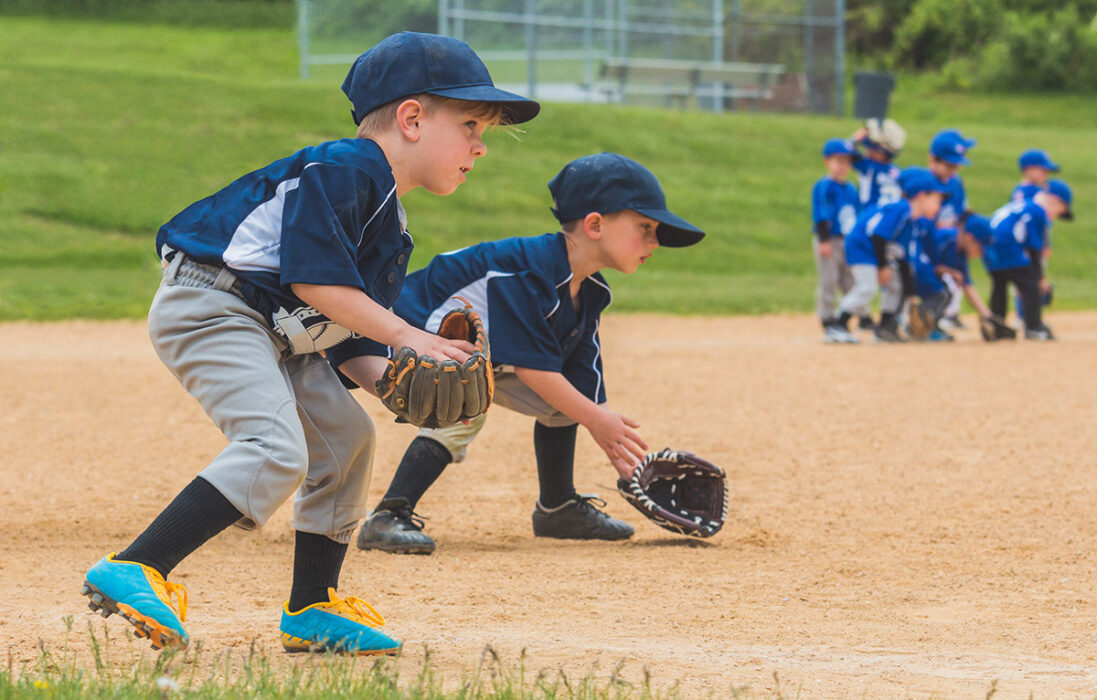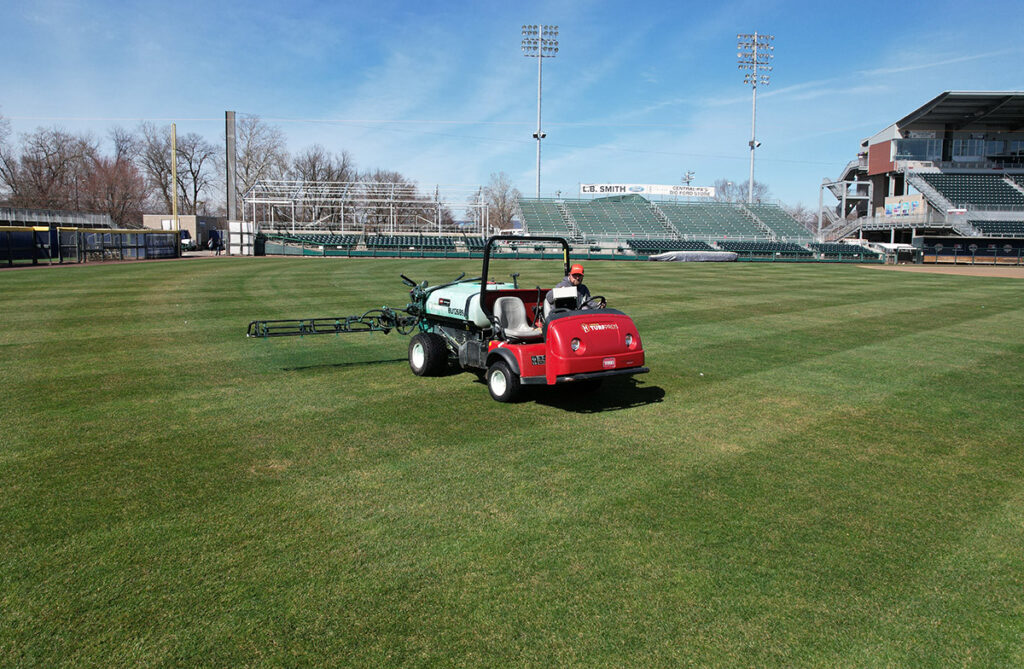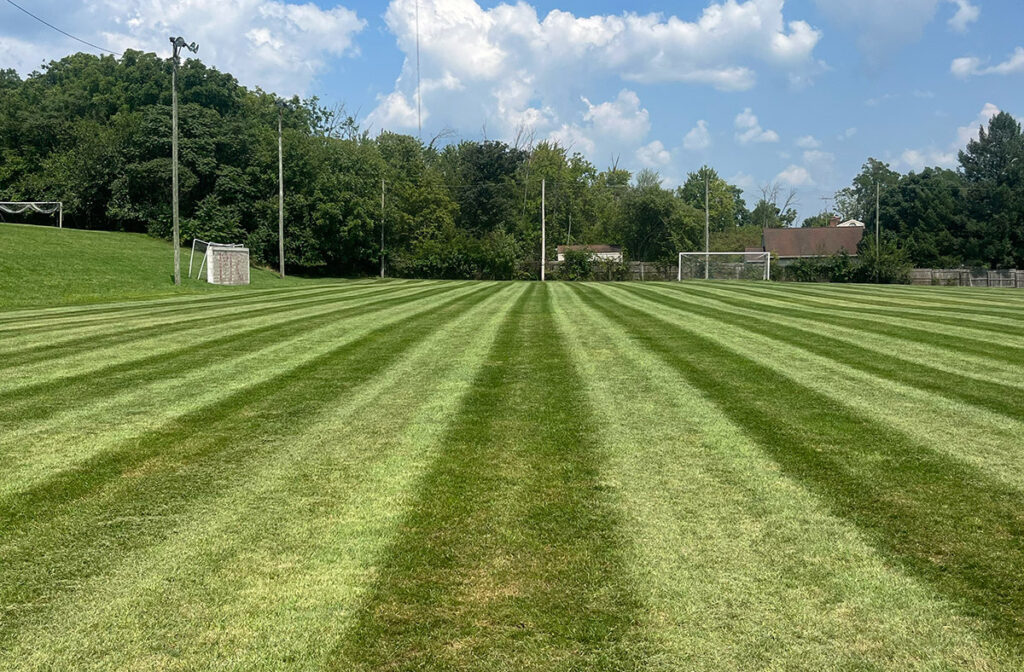
Athletic fields take a beating; nonstop activity tearing up the turf. Before you know it, you’re dealing with bare spots, lumps, and puddles that could swallow a shoe. With a little TLC, you can turn your field into a safe and game-ready surface that’ll make players and fans cheer before the game even starts. Let’s break down some field maintenance tips, sport by sport.
Why Field Maintenance is Important
A great game starts with a well-maintained field. No matter the sport, the playing surface’s quality sets the tone. Poor field conditions can cause injuries and unhappy players, not to mention stress for you.
Natural grass fields need consistent care to withstand wear, ensure safety, and look professional. With the right approach, your sports fields can meet the highest standards.
How to Maintain a Football Field
Football fields take some of the hardest hits, especially in high-traffic areas like the midfield and endzones. “Football fields are some of the toughest to maintain in Central PA because they see constant action in concentrated areas,” says Andy Zook, Turf Manager at JHL Turf Pros. “The key is staying ahead of the damage,” Zook adds. “Timely aeration, reseeding, and smart irrigation keep the field safe and looking great.”
Key Tips for Football Fields:
- Aerate Regularly: Use a solid tine aerator to loosen compacted soil and improve water and nutrient flow.
- Repair Damage Quickly: Overseed heavily used areas with tough grasses like Turf Type Tall Fescue and promptly patch bare spots.
- Irrigate Thoughtfully: Water deeply but less often to grow deep roots. Check for standing water to identify irrigation issues.
- Fertilize Correctly: Apply balanced fertilizers during growing season to maintain turf health, color, and weed control.
- Set Mowing Height: Keep the grass slightly higher (2.5” to 3”) to cushion impacts and boost durability.

How to Maintain a Softball Field and Baseball Field
How to maintain a baseball field and softball field depends on healthy, well-kept grass for fair gameplay and player safety. “As the Official Lawn Care Provider of the Harrisburg Senators, we’ve seen firsthand how Central PA’s weather and soil can impact athletic fields,” says Jon Hubler, Founder & CEO of JHL Turf Pros. “That’s why we focus on practices like aeration, fertilization, and overseeding to keep fields safe and game-ready all season long.”
Key Tips for Softball and Baseball Fields:
- Mow Strategically:
- Keep grass at a consistent height for smooth ball movement and solid footing.
- Alternate mowing patterns to reduce turf stress and prevent soil compaction.
- Use reel or rotary mowers for a clean, professional cut. Frequently sharpen the blades on rotary mowers.
- Fertilize and Overseed:
- Apply balanced fertilizer to strengthen turf and improve resilience.
- Overseed with durable grasses like Turf Type Tall Fescue to repair damage and maintain coverage.
- Address high-wear zones, focusing on areas like outfielder positions, foul lines, outfield edges, and sliding zones.
- Irrigate Smartly:
- Water deeply but less often to encourage deep roots.
- Perform regular inspections to assure the right amount of water is getting to all areas of the turf fields.
- Regularly water the infield mix to assure proper moisture levels to keep the dust at bay during play while avoiding standing water and muddy infield skins.
- Don’t Try to Do It All Yourself – Who the Harrisburg Senators Use
- It can be tough finding a reliable lawn care company that communicates well and does a great job. Brandon Forsburg, Senior Director of Field and Facility Operations for the Harrisburg Senators said, “We partnered with JHL Turf Pros for their commitment to excellence and quality. This past season, they played a key role in making our field look the best it has in YEARS. We’re proud to have them as our Official Lawn Care Provider.”

How to Maintain a Soccer Field
Soccer fields endure nonstop activity, especially in goalmouths and central zones. A smooth, durable field is crucial for safe play.
Key Tips for Soccer Fields:
- Overseed High-Traffic Areas: Focus on worn zones like goalmouths and midfield to ensure thick coverage.
- Aerate Regularly: Prevent compaction with solid tine aeration, helping roots grow strong.
- Irrigate Evenly: Avoid overwatering, which weakens turf. Maintain the irrigation system for even coverage.
The Keys to Great Athletic Fields
Healthy fields are the foundation of every game. Each sport has unique demands, but these principles guide your maintenance plan:
Fertilize for turf health and an esthetically pleasing field.
- Aeration to prevent compactions and increase soil health.
- Maintain proper mowing height for safety and growth.
- Overseeding to avoid bare spots in high-use areas.
- Adequate irrigation to improve root growth and not create puddles or holes.
- Fertilize for turf health and an esthetically pleasing field.
